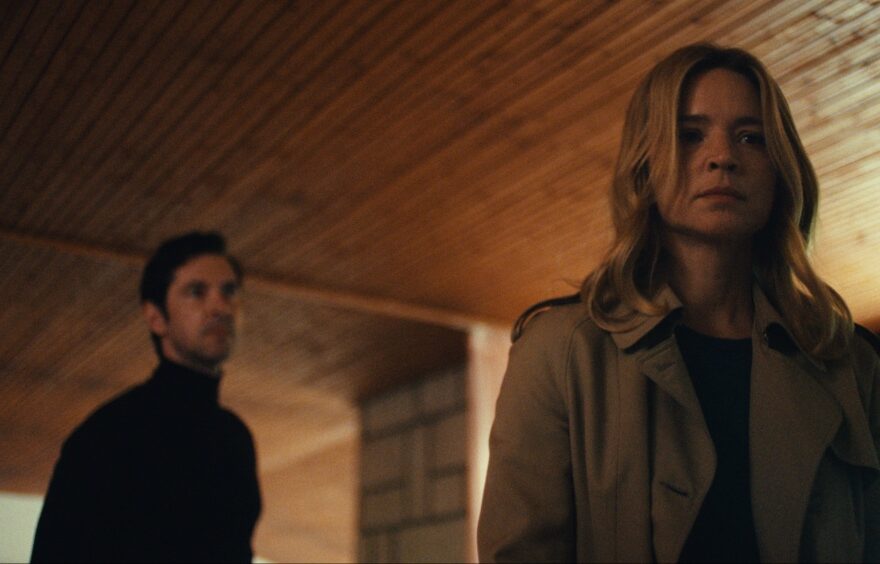On the face of it, Grégoire is the kind of husband that makes many a woman wish hers would shape up a bit. He’s tall, strong and stylish, with a job in banking that comfortably pays the bills, and the sculpted good looks of, well, the actor Melvil Poupaud — who plays him with enough upfront charm to cover a slight chill at the edges. All that, and he dotes on his wife Blanche (Virginie Efira), insisting on a degree of togetherness that makes clear his fidelity. Those observing more closely, however, may have other concerns: Why is he constantly calling her at work? Why does she never go out with friends? That he’s a psychotic abuser isn’t played as a surprise twist in Valérie Donzelli’s nervy, finely acted domestic thriller “Just the Two of Us” — even as it dabbles in genre tropes, the film presents an all-too-unremarkable reality for many women.
Following the disposable comedy “Notre Dame” and the overwrought incest melodrama “Marguerite & Julien,” this is a welcome reset for actor-turned-director Donzelli, bringing the jagged emotional candor of her breakout feature “Declaration of War” to a more commercial proposition. Having already hit theaters in France following its Cannes premiere, “Just the Two of Us” should translate easily enough to global arthouses, where distributors may capitalize on the name value of two other contributors: co-writer Audrey Diwan, director of recent Golden Lion champ “Happening,” and the ubiquitous Efira, adding yet another sharp, sympathetic study in burdened womanhood to her portfolio.
Make that two, in fact, since one of the few tricksy touches in an otherwise straightforwardly told tale is a dual role for the star, playing both Blanche and her adoring, happy-go-lucky twin sister Rose. At the outset of the film, they have a close relationship, frequently hanging out and carousing in their coastal hometown in Normandy. Schoolteacher Blanche, the more reserved of the two, wants something more: When Grégoire, urbane and sophisticated, puts the moves on her at a party, it seems she’s found it, even if DP Laurent Tangy, bathing their first encounter in sweaty red light, suggests otherwise. Rose too appears less than convinced, though doesn’t interfere when Grégoire and Blanche marry — or when he takes a new job in Metz, moving Blanche across the country under what turn out to be false pretenses.
Thus isolating his wife from her family, Grégoire proceeds to follow the abuser’s playbook to the letter, limiting their social circle and activities, and guilt-tripping Blanche over any perceived deviations from her duties to him and their two children. When, desperate for release, she finally hooks up with a kindly stranger via an app, Grégoire senses her transgression, his possessive instincts going into violent, torturous overdrive — finally sending Blanche into fight-or-flight mode. This pivot is signalled throughout by a plain framing device, as Blanche shares her story to this point with an attentive lawyer (Dominique Reymond), yet “Just the Two of Us” insists we’re never comfortably assured of her safety and stability: The potentially cruel uncertainties of the legal system lie gapingly ahead.
This kind of story has been more luridly told in such potboilers as the 1991 Julia Roberts vehicle “Sleeping With the Enemy,” but Donzelli and Diwan’s tight, no-nonsense script — adapted from Éric Reinhardt’s well-regarded novel “L’amour et les forêts” — has little time for cheaply contrived imperilment of its protagonist, instead focusing on the cumulative everyday anxiety of living with domestic violence and mental cruelty, to increasingly suffocating, disorienting effect. (“Why did you let me do this?” Grégoire asks Blanche after one attack; she’s at risk of internalizing such victim-blaming.) If the film feels a little compressed in its second half, with a clutter of secondary characters who may have had more breathing room on the page, it nonetheless culminates in a gratifying gesture of faith in female community.
Efira’s pained, physically demanding performance cycles through a range of survival modes, from brazen defiance to passive, energy-conserving acquiescence; Poupaud makes for a frightening, steadily relentless tormentor, while still retaining flashes of the seducer who snared his prey in the first place. The film’s restrained though starkly canal sex scenes, edited so briskly by Pauline Gaillard as to resemble sense memories, feel significant in this regard — not merely furnishing the film’s erotic-thriller trappings, but making visceral sense of a near-fatal attraction.
Read More About:
Source: Read Full Article
